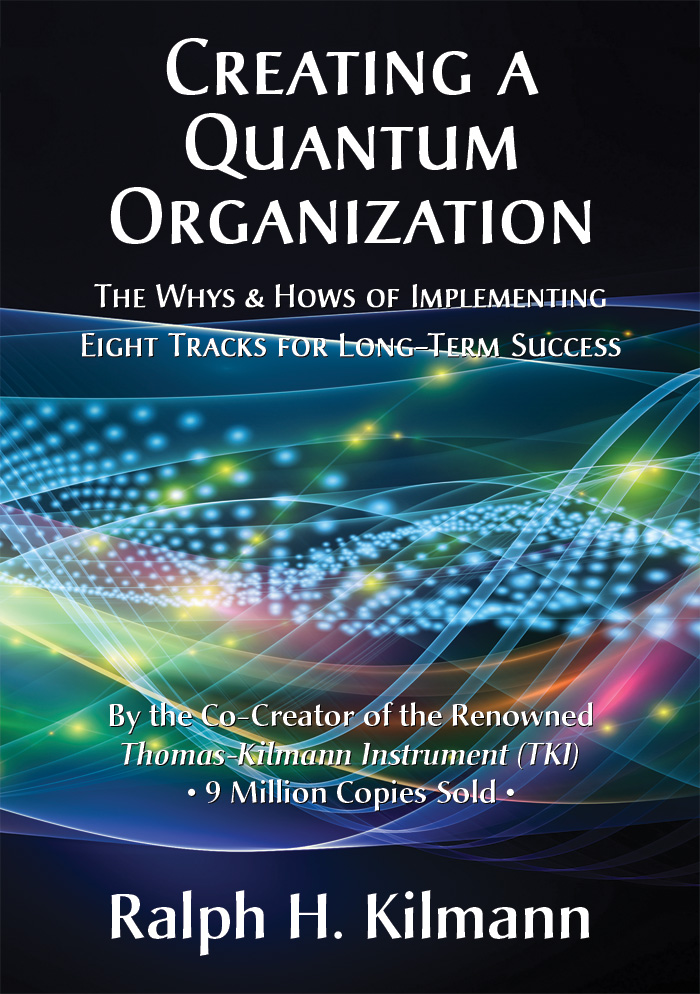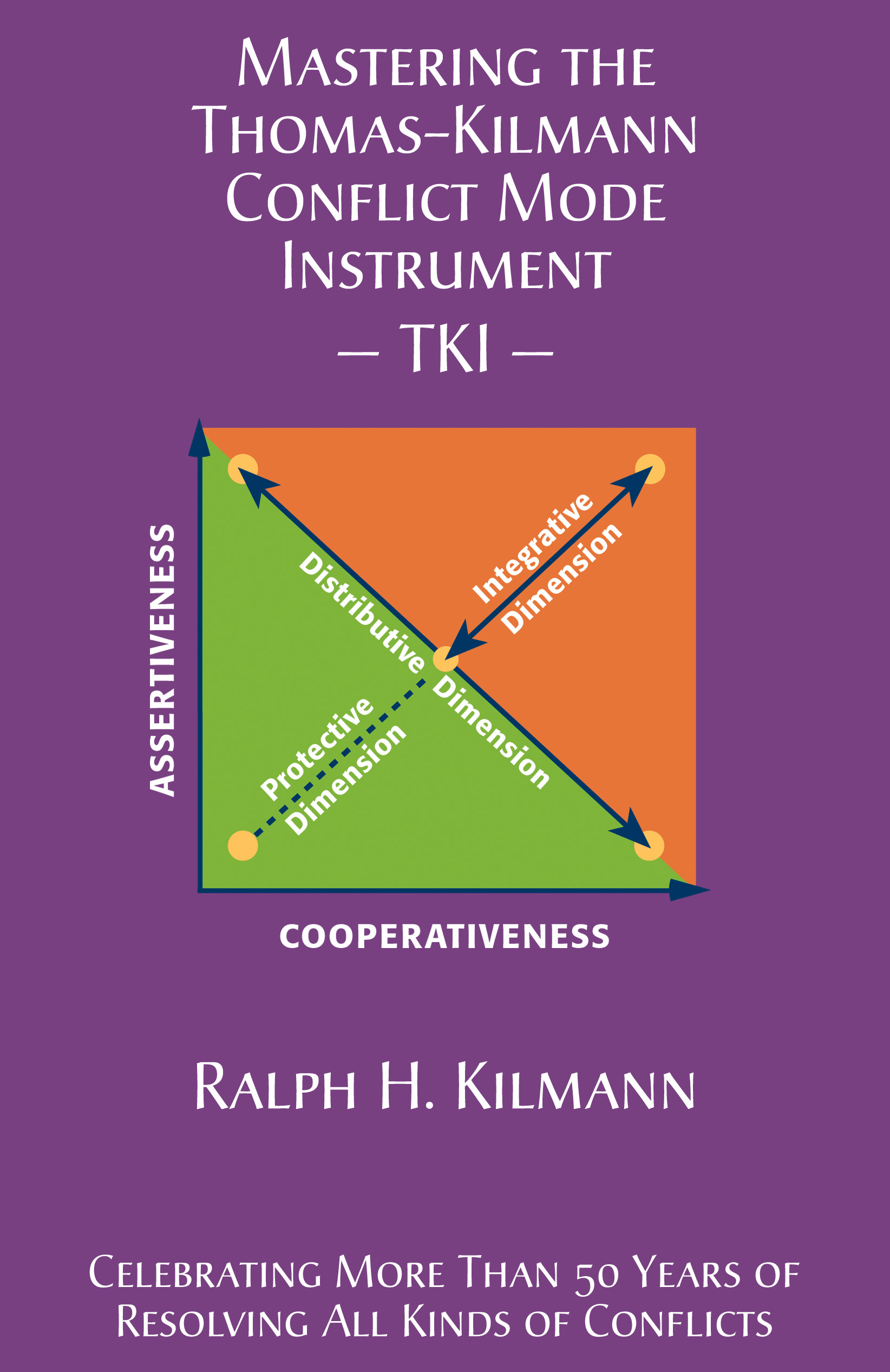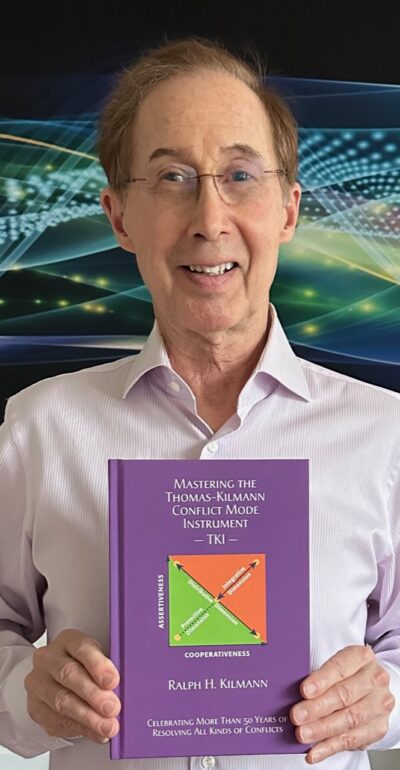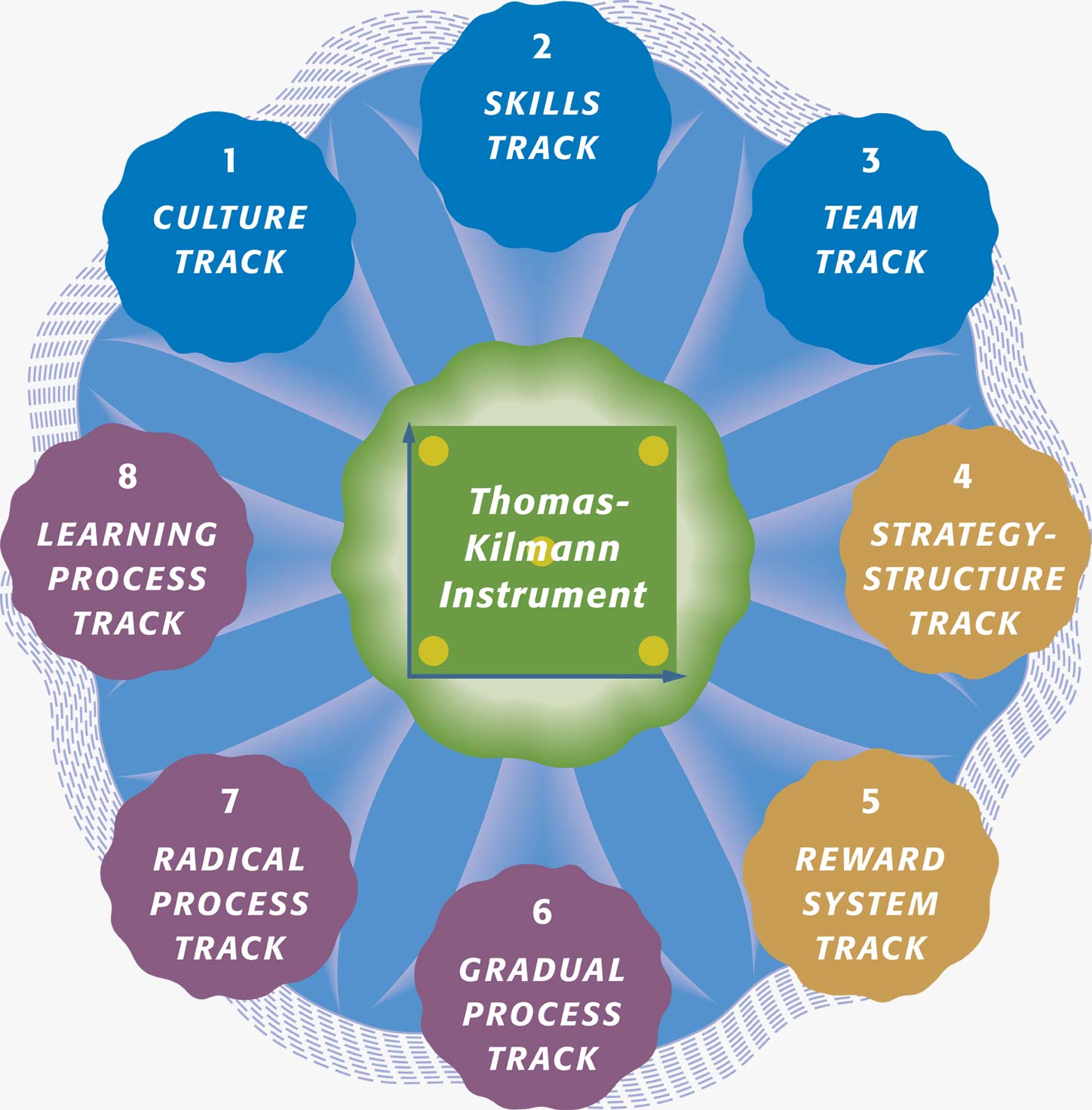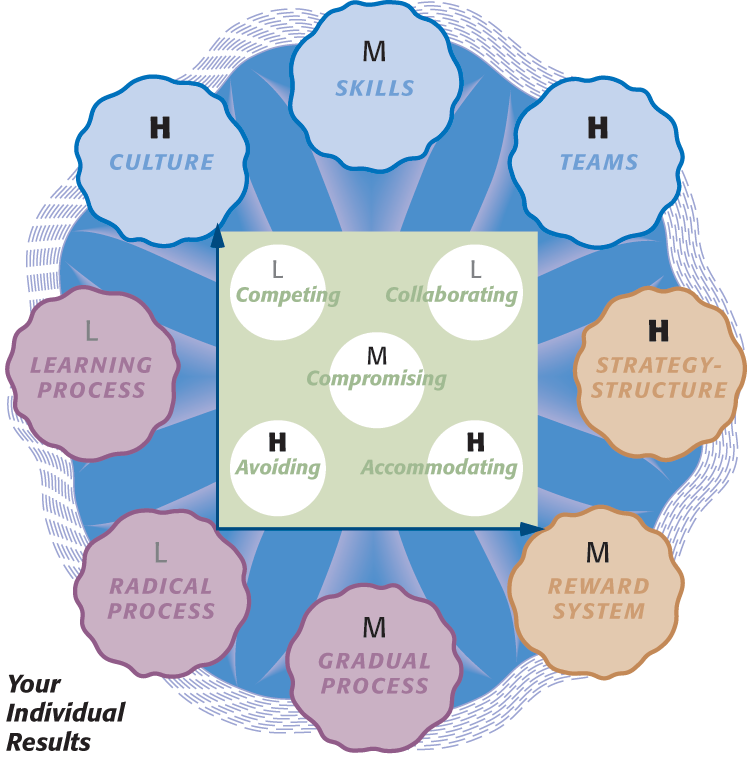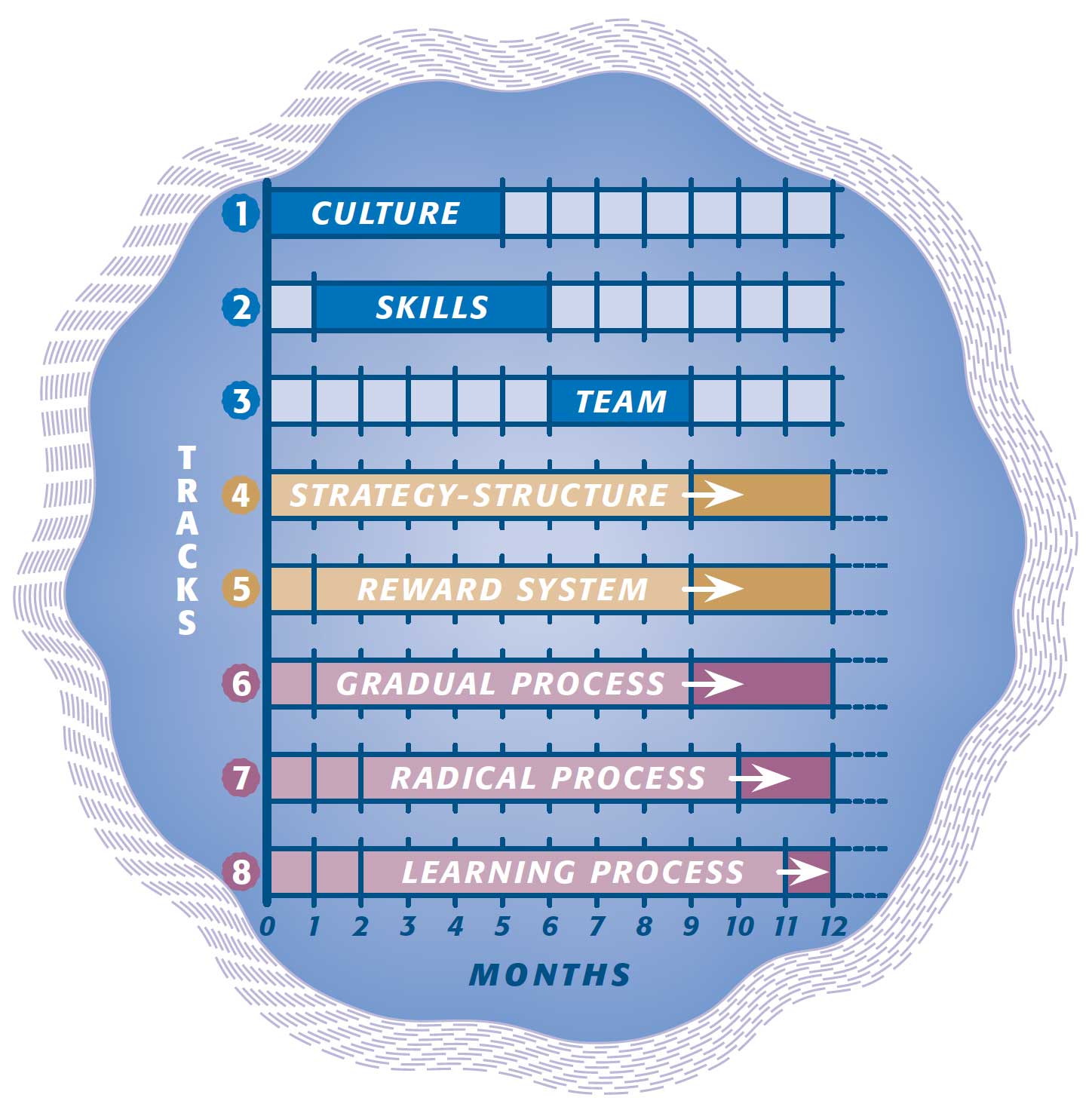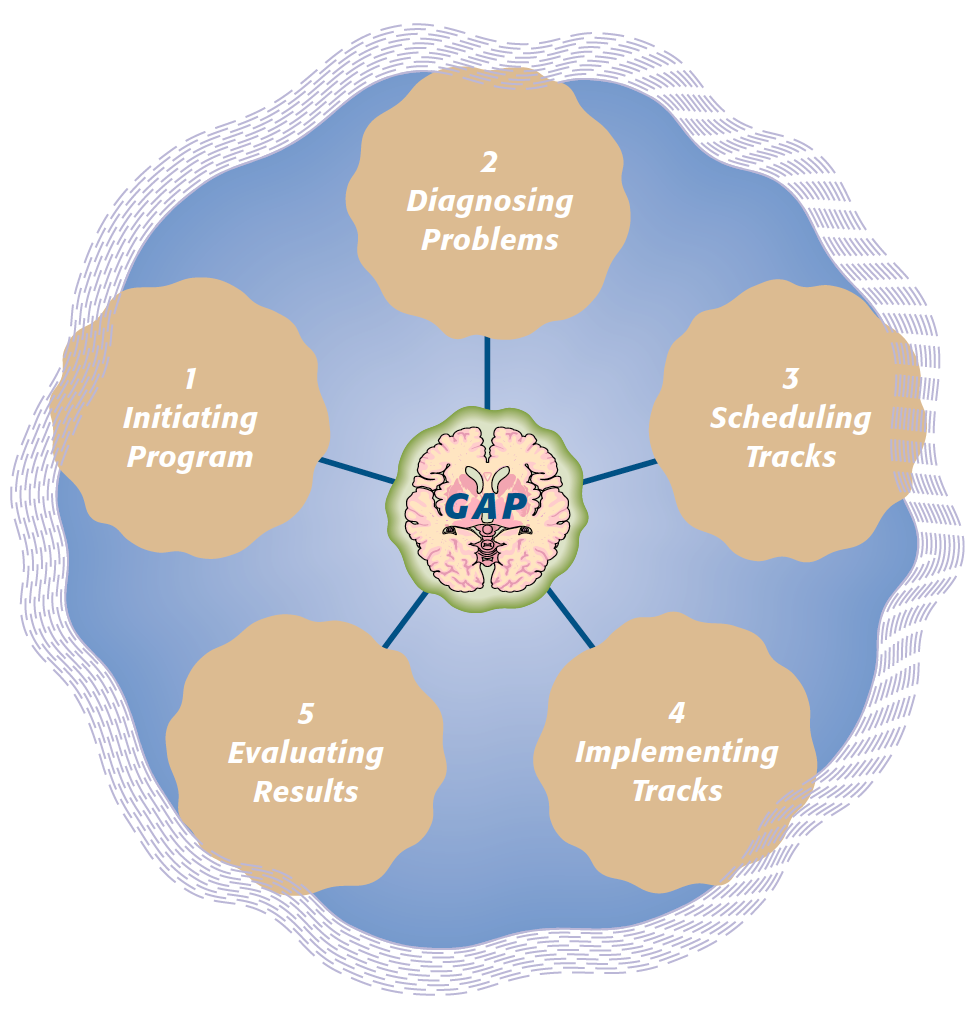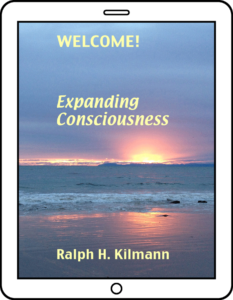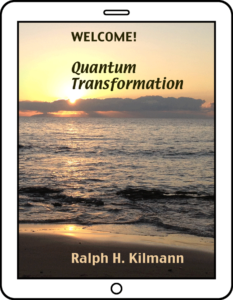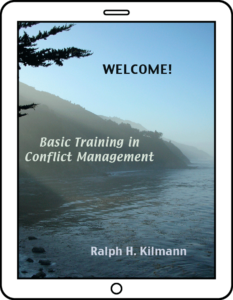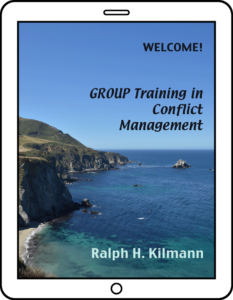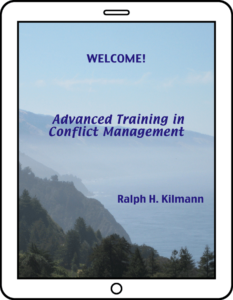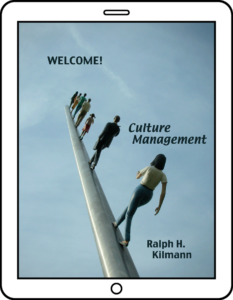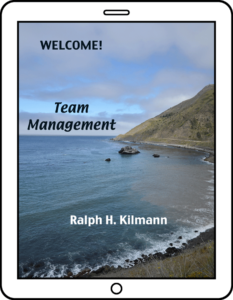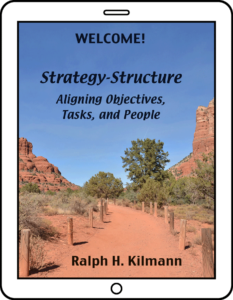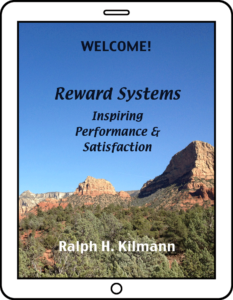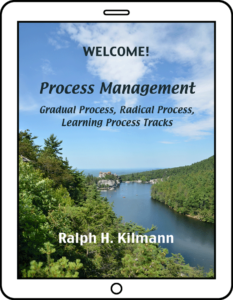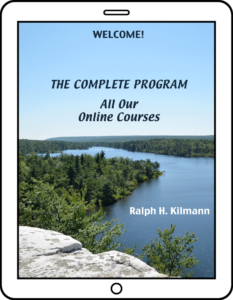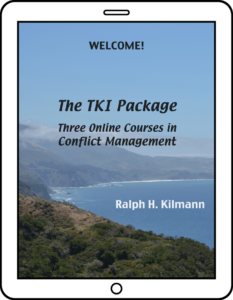Based on Dr. Kilmann’s fifty-plus years of organizational research, executive teaching, and extensive management consulting, the complex topics of conflict and change are intertwined through a carefully orchestrated sequence of eight tracks for quantum transformation: cultures, skills, teams, strategy-structures, reward systems… and the three process management (improvement) tracks. This sequence of change tracks reveals the Method that can eventually achieve the Kilmann Diagnostics Mission.
In the next section, you’ll discover The Quantum Wheel, which integrates change management and conflict management. You’ll then be introduced to our newest assessment tool: the Kilmann Organizational Conflict Instrument (KOCI). This diagnostic instrument identifies the variety of System Conflicts that can produce either transformation or stagnation, depending on how well those nagging conflicts are addressed and then resolved—as illuminated with the TKI Conflict Model and its five conflict-handling modes. Next, you’ll be able to read a Short Story that powerfully demonstrates the differences between a quick fix attempt to improve an organization and a completely integrated program of quantum transformation. Lastly, you’ll see a summary of our series of Online Courses that provide the practical knowledge for resolving an organization’s identified systems conflicts, thereby enabling you to succeed at quantum transformation.
FULLY ACTIVATING THE QUANTUM WHEEL FOR ACHIEVING THE KILMANN DIAGNOSTICS MISSION
As captured in this panoramic diagram, while the HUB of “The Quantum Wheel” is conflict management (illuminated by the renowned Thomas-Kilmann Conflict Model), the SPOKES of “The Quantum Wheel” are Dr. Kilmann’s eight tracks for achieving long-term success and personal meaning for any group, team, or organization.
The first three tracks represent the quantum infrastructure (the culture, skills, and teamwork) of a group, community, or organization. The next two tracks document the formal systems: Where are we headed (strategy)? How can we organize to get there (structure)? And what do we receive for helping out (rewards)? The last three tracks enable people to improve the quality and speed of their key processes (decisions and actions), as guided by their quantum infrastructure and formal systems.
What is the principle behind this elaborate sequence of quantum transformation? Each track establishes the foundation for achieving the full potential of each subsequent track. Indeed, learning how to make the best use of this carefully orchestrated sequence of eight tracks will give you the essential tools for effectively managing the interface of conflict and change within today’s fast-paced, interconnected, global village.
MASTERING THE THOMAS-KILMANN CONFLICT MODE INSTRUMENT (TKI)
If you want to read the most up-to-date and comprehensive discussion about the TKI tool in one single document, consider purchasing Dr. Kilmann’s first TKI Book (published in 2023): Mastering the Thomas-Kilmann Conflict-Mode Instrument: Celebrating More Than 50 Years of Resolving All Kinds of Conflicts.
THE KILMANN ORGANIZATIONAL CONFLICT INSTRUMENT (KOCI)
Directly below, see Dr. Kilmann’s 12-minute video presentation that summarizes his latest assessment tool: The Kilmann Organizational Conflict Instrument. This diagnostic instrument has been designed to identify an organization’s systems and processes (i.e., the SPOKES of the Quantum Wheel) that are significantly undermining—hence, misdirecting—members’ use of those five conflict modes (i.e., the HUB of the Quantum Wheel), so the most troublesome “systems conflicts” can then be transformed to actively support the effective use of all five conflict modes in the workplace. In essence, the Kilmann Organizational Conflict Instrument fully appreciates that an organization’s systems and processes affect at least 80% of how conflict is addressed and resolved in the workplace, while individual preferences for using certain conflict modes affect, at most, about 20% of behavior and results. As such, the KOCI is the single, most comprehensive assessment tool for actualizing the Kilmann Diagnostics Mission & Method.
AN OLD STORY ABOUT
THE NEW QUICK FIX
Ralph H. Kilmann
So you can fully appreciate the Kilmann Diagnostics Mission & Method, as illustrated by “The Quantum Wheel,” I will now share what I learned from a three-day workshop that I conducted a number of years ago for the fifty senior executives of a large division of a Fortune 100 company. Before these top executives decided to proceed with quantum transformation, they wanted to explore the philosophy of a completely integrated program and thoroughly understand the particular change initiatives that were embedded in each track.
On the last day of this three-day workshop, after considerable time had already been spent on discussing why the integrated sequence of the eight tracks is fundamentally different from the prevalent cycle of ad-hoc, quick-fix approaches, the chief financial officer (CFO) of the firm raised his hand and proclaimed: “I now understand what you have done. When you get right down to it, your completely integrated program is a quick fix!”
I was shocked at this obvious lack of understanding, but I tried not to show it. Instead, I asked the CFO: “Please tell me more about what you have on your mind. I’m not sure I understand what you just said.”
The CFO proceeded to share his perspective: “Sure, I’ll be glad to explain what I mean. I’ve been working for this company for over twenty years now. I’ve seen every improvement program and change initiative come and go: quality circles, participative management, teaming, matrix management, empowerment, employee involvement, and organizational learning. You name it; we’ve done it!
“But hardly anything around here that really matters much has actually changed. Yes, we have new charts, job titles, buildings, products, people, and all kinds of fancy computers—but we still make decisions in the same old way. We still put one another down in the same old way. We still exclude certain people from key meetings because we don’t want to hear different points of view. And we continue to blacklist people if they didn’t support our pet projects.
“Yet now you’re telling us that by going through a sequence of eight tracks and doing first things first and getting it right before you go on—which includes explicitly facing our root dysfunctions at the start and gradually proceeding to change our invisible infrastructures and align our formal systems, month by month, before we try quality management and reengineering again—we can transform our organization in just a few years. Well, your program IS a quick fix compared to what we’ve been through for the past two decades!”
Our Sequence of Online Courses for
Activating the Quantum Wheel and Thus
Achieving the Kilmann Diagnostics Mission
The Vital Foundation
To learn about the advent of the new Consciousness Revolution, which is sure to become the future of organizational development and human resource management, we first offer you our most stimulating and paradigm-breaking recorded online course: Expanding Consciousness in Organizations.
As a grand overview of the eight-track program for transforming a Newtonian organization into a quantum organization, including the Courage Assessment and the Influence Survey, we next offer you our most integrative online course: Quantum Transformation.
Conflict Management
To learn all about the Thomas-Kilmann Instrument, we next provide three courses that explain conflict management for individuals, groups, and organizations, which set the stage for our completely integrated program for quantum transformation: BASIC Training, GROUP Training, and ADVANCED Training in Conflict Management.
Change Management
Building on our BASIC, GROUP, and ADVANCED courses, we then offer an integrated series of online courses on change management. These additional courses—making effective use of the TKI and our other assessment tools—such as the Culture-Gap® Survey and the Team–Gap Survey—provide the means for establishing a healthy culture, enhancing critical thinking skills for addressing complex problems, fostering organization-wide teamwork, revitalizing the formal systems, and then improving the processes that flow within—and across—all aspects of an organization: Culture Management, Critical Thinking Skills, Team Management, Strategy-Structure, Reward Systems, and Process Management.
Course Collections That Epitomize the
Kilmann Diagnostics Mission & Method
If you would like to take our eleven online courses and nine assessment tools on conflict management and change management, we offer the entire series, including two TKI assessments, in one collection at a large savings: The Complete Program. This course collection captures all the deep knowledge that flows from the Kilmann Diagnostics Mission & Method.
If you would like to gain mastery of the Thomas-Kilmann Instrument (TKI) and conflict management, we offer our three TKI-based courses, including two TKI assessments, in one collection at a nice discount: The TKI Package.


